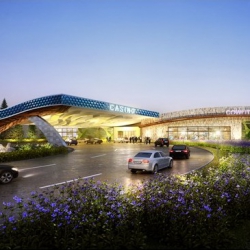
Ilani Casino across the border in Washington threatens both Portland Meadows and Oregon lotto ticket sales.
The Oregon Lottery and Portland Meadows continue their confrontation over Portland’s top poker room, according to Willamette Week. Thought the showdown involves the legality of card room entry fees, Portland Meadows faces the permanent loss of revenues from lottery ticket terminals housed in the casino for years.
Recently, a top official for the Oregon Lottery sent a letter to Portland Meadows, telling its ownership that the racetrack-casino needs to stop charging entry fees in its land-based card room. Though those poker room entry fees are deemed legal by the City of Portland, the Oregon Lottery insists they violate Oregon state law.
The standoff began with a police investigation.
In July 2017, the Oregon State Police investigated whether Portland Meadows’ poker games violate state and local “house income” gambling laws. Police investigators decided the racetrack’s poker room did violate the law by collecting a rake from card sessions, while also acting as a bank, due to exchanging money for chips.
Oregon Lottery Threatens to Cancel Contract
The Oregon Lottery Association responded by canceling its contract with Portland Meadows, which holds 10 lottery terminals in the complex. In August, Portland Meadows asked the Oregon Lottery to reconsider its decision.
Lottery Director Barry Pack responded in a letter dated August 30. Mr. Pack said the casino had satisfied local laws by making concessions to the City of Portland. At the same time, Pack says Portland Meadows continued to violate Oregon gambling laws.
In lieu of that opinion, Barry Pack refused to consider his earlier decision. In his letter, the lottery director stated, “[The] Lottery does not agree with [Portland Meadows’] interpretation of state law.”
Barry Pack Sets Poker Room Deadline
Instead, Barry Pack gave Portland Meadows until October 30 to cease breaking state laws, officially cancel its contract with the lottery, or appeal the cancellation in state court. Given the amount of money involved in operation of the lottery machines, one can expect to see Portland Meadows file suit in an Oregon civil court. A lawyer for Portland Meadows did not return calls about possible legal action.
In 2016, the racino’s lottery terminals generated $1.83 million for the state. Portland Meadows received $350,000 in commissions for the money generated by those terminals.
Oregon Legislature Cannot Pass Poker Amendment
Earlier this year, Oregon lawmakers sought a legislative fix to the controversy, but an amendment to Oregon’s gambling law did not receive enough support to pass. Thus, Portland Meadows’ 22-table poker room remains in jeopardy.
It is not the only Portland-area poker room which skirts state law. Portland is home to dozens of small poker rooms, which get around local ordinances by charging an entry fee. The City of Portland overlooks such infractions, in order to help small business owners remain solvent.
Competition from Ilani Casino
Both of the gaming operators are concerned about the competition from the Ilani Casino across the border in Washington, which opened for business on April 24, 2017. Though Ilani Casino is in another state, the site is only a 25 minute drive from Downtown Portland.
The Cowlitz Indian Tribe owns the Ilani Casino, but it entered into a financing agreement with the Mohegan Sun in order to afford the $510 million cost of building the casino. Mohegan Sun, the casino brand of the Mohegan Tribe of Connecticut, manages the operation and uses its vast customer database to market to potential visitors. Suddenly, the Oregon Lottery and Portland Meadows faced competition from a bigger casino with more experience marketing to American gamblers, even if the Mohegan Tribe has not operated on the West Coast before.
Portland Meadows History
Portland Meadows opened as a racetrack in 1946. In July 2001, the racecourse gained approval to build a casino gaming venue on the complex. In 2011, the horse racing venue and racino was purchased by the Stronach Group, a Canadian horse racing and casino company based in Aurora, Ontario.
